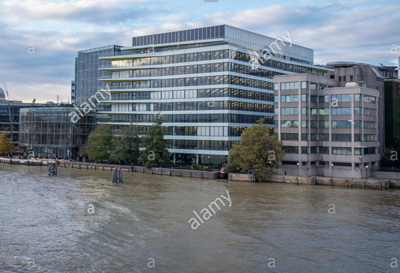Fieldfisher was surprised by an "unexpectedly high" business rates bill for its London office, RollOnFriday understands.
In 2015, the firm took 81,270 sq ft at Riverside House spread across three floors. Before it had even unpacked the desks, it appealed the rateable value of its new premises. Business rates are calculated by multiplying a property's rateable value, which is an estimate of its rental value, by a multiplier set by the government. Fieldfisher argued that its premises' rateable value was too high, and its appeal was partially successful. As a result, in 2016 its rateable value was revised to £2.34m, attracting a business rate of £1.12m a year.
However, the benefits were immediately wiped out when a Supreme Court case, Woolway v Mazars, introduced the so-called 'staircase tax'. The court ruled that adjoining floors separated by communal spaces, as was the case at Riverside House, would receive separate business rates bills. So instead of being assessed as one single space, which would have attracted a cheaper rent, each of Fieldfisher’s floors was assessed separately. That resulted in a new rateable value of £2.495m, and a business rate of approximately £1.3m a year.
Then in 2017 the government ordered a re-assessment of rateable values, seven years after the last review. The catch-up had a dramatic effect on rates across London, where property values had risen hugely since 2010. Fieldfisher's new rateable value was assessed at £3.9m.
Because the government cushioned the effect of rises by phasing them in each year until a business was paying the full amount due, the maximum increase a business used to have to face was 12.5%. But here, too, was a shock. In September 2016 the government introduced a new category for the largest properties, and decided that they would have to pay 42% of the rise in rates from year one, plus the usual inflationary increase. It meant that in the space of a year, Fieldfisher’s business rates bill soared 58%, from £1.3m to over £1.9m. By comparison, Freshfields, which has substantially deeper pockets, saw its rates rise by 27%.
Gerald Eve’s Head of Business Rates, Jerry Schurder, told RollOnFriday, “This level of increase in unprecedented and it is totally unreasonable to expect businesses to face it without much more prior warning”.
Sources within Fieldfisher said the firm had been presented with a "totally unexpected" rates bill of "almost £2 million". Initially a Fieldfisher spokeswoman told RollOnFriday "that is absolutely not the case". After being provided with the figures, a spokesman said, "we have a new rates bill but it's not unexpected".
Tip Off ROF
In 2015, the firm took 81,270 sq ft at Riverside House spread across three floors. Before it had even unpacked the desks, it appealed the rateable value of its new premises. Business rates are calculated by multiplying a property's rateable value, which is an estimate of its rental value, by a multiplier set by the government. Fieldfisher argued that its premises' rateable value was too high, and its appeal was partially successful. As a result, in 2016 its rateable value was revised to £2.34m, attracting a business rate of £1.12m a year.
However, the benefits were immediately wiped out when a Supreme Court case, Woolway v Mazars, introduced the so-called 'staircase tax'. The court ruled that adjoining floors separated by communal spaces, as was the case at Riverside House, would receive separate business rates bills. So instead of being assessed as one single space, which would have attracted a cheaper rent, each of Fieldfisher’s floors was assessed separately. That resulted in a new rateable value of £2.495m, and a business rate of approximately £1.3m a year.
Then in 2017 the government ordered a re-assessment of rateable values, seven years after the last review. The catch-up had a dramatic effect on rates across London, where property values had risen hugely since 2010. Fieldfisher's new rateable value was assessed at £3.9m.
 |
You'd think it woud be cheaper with all those alamys floating around. |
Because the government cushioned the effect of rises by phasing them in each year until a business was paying the full amount due, the maximum increase a business used to have to face was 12.5%. But here, too, was a shock. In September 2016 the government introduced a new category for the largest properties, and decided that they would have to pay 42% of the rise in rates from year one, plus the usual inflationary increase. It meant that in the space of a year, Fieldfisher’s business rates bill soared 58%, from £1.3m to over £1.9m. By comparison, Freshfields, which has substantially deeper pockets, saw its rates rise by 27%.
Gerald Eve’s Head of Business Rates, Jerry Schurder, told RollOnFriday, “This level of increase in unprecedented and it is totally unreasonable to expect businesses to face it without much more prior warning”.
Sources within Fieldfisher said the firm had been presented with a "totally unexpected" rates bill of "almost £2 million". Initially a Fieldfisher spokeswoman told RollOnFriday "that is absolutely not the case". After being provided with the figures, a spokesman said, "we have a new rates bill but it's not unexpected".








Comments
166
158
:|
178
149
165
140
180
141
168
129